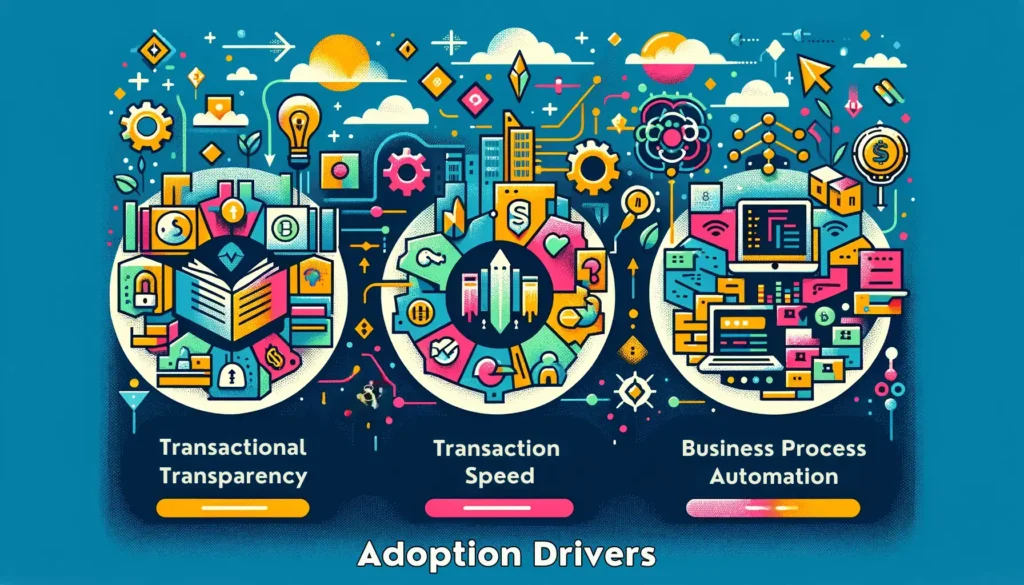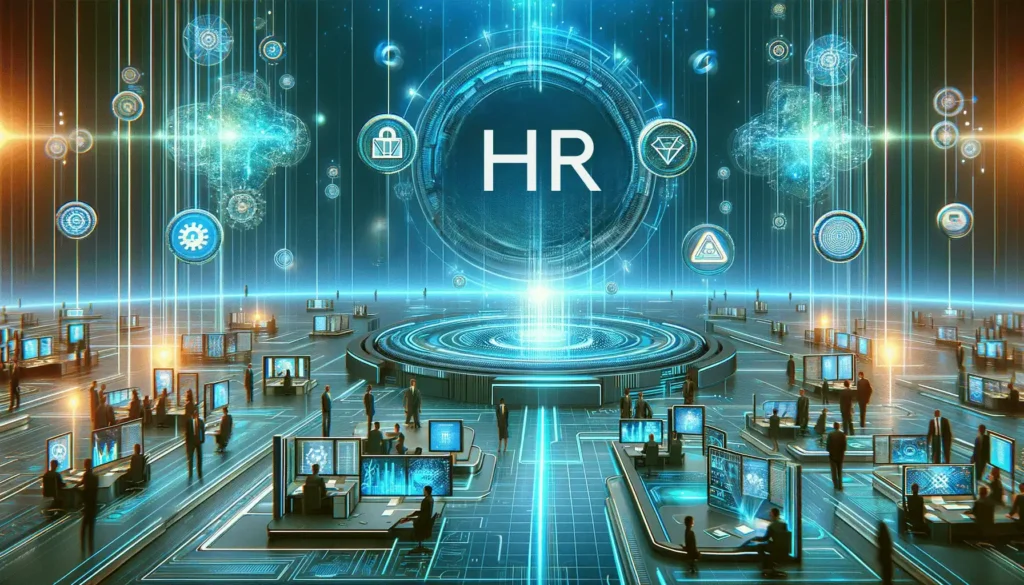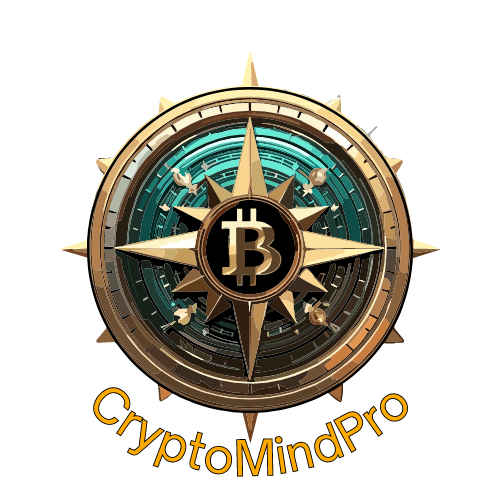“Blockchain in Human Resources” – a phrase that might seem like a blend of two distant worlds, but it’s where modern technology meets the cornerstone of every organization.
Blockchain, a term often associated with cryptocurrencies like Bitcoin, is stepping beyond finance and reshaping the way human resources (HR) functions.
Imagine blockchain as a digital ledger, but instead of tracking only financial transactions, it’s revolutionizing how we manage and understand HR processes.
At its essence, blockchain in HR is about bringing a level of security and efficiency previously unimagined. This technology, which underpins cryptocurrencies, operates as a shared digital record-keeper.
What makes it unique is its decentralized nature, making it nearly impossible for anyone to tamper with the information once it’s recorded.
Think of it as a digital vault that everyone can see, but no one can alter dishonestly.
Key Takeaways
- Blockchain’s Role in HR: It’s not just for tracking Bitcoin anymore; blockchain is a game-changer for HR practices.
- Security and Efficiency: With blockchain, HR processes become more secure and efficient, reducing risks and errors.
- Accessibility for Everyone: Blockchain in HR means more straightforward, more transparent processes, benefiting employees and employers alike.
Advantages of Blockchain in HR
- Enhanced Transparency: Every transaction on a blockchain is visible, creating a high level of trust in HR processes.
- Improved Data Security: The decentralized nature of blockchain ensures the security of sensitive HR data.
- Streamlined Operations: Blockchain can automate and speed up HR tasks like payroll, making them more efficient.
Boldly Stepping into the Future: Blockchain’s integration into HR is a bold step towards a more transparent, efficient, and secure future.
It’s a technology that’s not only transforming the world of finance but also setting new standards in the HR industry.
As someone curious about cryptocurrency and its applications, understanding blockchain’s role in HR opens up a new perspective on how this technology can influence various aspects of our lives and work.
Key Adoption Drivers for Blockchain in HR
As we journey deeper into the world of blockchain and its applications in human resources, let’s explore the key factors driving its adoption in the HR sector.
For someone just starting out in the blockchain world, these points highlight how a technology famous for cryptocurrencies is making a significant impact in everyday business processes.
📊 The Drivers Behind the Change
The adoption of blockchain in HR is fueled by several key factors:
- Increasing Transactional Transparency
- Every transaction on a blockchain is recorded transparently, making the HR processes more open and trustworthy.
- Accelerating Transaction Speeds
- Blockchain technology reduces the time needed for various transactions, such as payroll processing, making HR operations more efficient.
- Automating Business Processes
- Through smart contracts and automated record-keeping, blockchain can streamline numerous HR tasks, reducing manual effort and errors.
🌟 Blockchain’s Impact on HR Functions
Blockchain isn’t just about making existing processes better; it’s about revolutionizing them.
Here are some ways blockchain is reshaping HR:
- Enhanced Data Security: The decentralized nature of blockchain ensures the security and integrity of HR data.
- Effortless Global Payments: Especially useful for multinational companies, blockchain simplifies cross-border payments, making it easier to manage a global workforce.
- Streamlined Recruitment Processes: Blockchain’s ability to verify credentials and employment history can significantly speed up recruitment, ensuring accuracy and authenticity.

Challenges in Adopting Blockchain in HR
Despite its numerous benefits, integrating blockchain into HR is not without its challenges. It’s crucial to understand these to appreciate the technology’s full potential and limitations.
- Technological Complexity
- Implementing blockchain technology in HR processes requires a significant shift in the current technological setup and a steep learning curve.
- Cybersecurity Risks
- While blockchain itself is secure, the endpoints and applications it interacts with might be vulnerable to cyber-attacks.
- Compliance and Legal Concerns
- The lack of standardized regulations for blockchain use, especially across different countries, poses a challenge in terms of legal compliance.
Understanding these challenges is key to successfully integrating blockchain into HR.
For more insights on navigating these challenges, check out our comprehensive guide here.
Use Cases of Blockchain in Human Resources
Delving into the world of blockchain and HR, it’s fascinating to see how this technology, often linked with cryptocurrencies like Bitcoin, is carving a niche in human resources.
This section will highlight how this innovative technology is transforming traditional HR tasks.
🌐 Global Reach of Blockchain in HR
Blockchain is not just a buzzword in the tech world; it’s making real changes in HR departments globally.
Here’s how:
Payroll Management
- Global Payments Made Easy: Blockchain simplifies international payroll, making it easier for companies to manage a global workforce.
- Efficiency and Security: It streamlines the process while ensuring each transaction is secure and transparent.
Recruitment and Verification
- Secure Credential Verification: Candidates can store their credentials on the blockchain, which HR can easily verify, thus speeding up the hiring process.
- Reduced Recruitment Costs: With blockchain, the need for intermediaries in the verification process is significantly reduced.
Employee Data Management
- Secure Storage of Sensitive Data: Employee personal data can be encrypted and stored securely on the blockchain, ensuring privacy and protection against data breaches.
Contract Management
- Smart Contracts: These digital contracts automate and enforce the terms of employment agreements, bringing efficiency and clarity to both employers and employees.
The Future of Personal Blockchains
A groundbreaking development in HR is the concept of personal blockchains for employees.
Imagine having your entire professional identity, including your qualifications, work history, and achievements, stored securely on a blockchain.
This personal blockchain can be accessed and updated by you, giving you full control over your professional data.
- Employee Control Over Data: Employees can manage who has access to their professional information.
- Seamless Career Transitions: With a personal blockchain, changing jobs or careers becomes smoother as your professional history is verifiable and easily accessible.
Challenges in Adopting Blockchain in HR
As we continue our exploration of blockchain in human resources, it’s important to recognize that introducing this innovative technology into traditional HR systems is not without its challenges.
Understanding these hurdles is crucial to appreciating the full spectrum of blockchain’s potential and limitations in real-world applications.
🚧 Overcoming the Obstacles
The path to integrating blockchain in HR isn’t always smooth. Here are some of the challenges faced:
Complexity of Implementation
- Learning Curve: Incorporating blockchain into existing HR systems requires a fundamental shift in technology and understanding.
- Training Needs: Employees and HR professionals may need training to adapt to the new blockchain-based systems.
Cybersecurity Concerns
- Endpoint Vulnerabilities: While blockchain is inherently secure, the applications and endpoints it interacts with might be susceptible to cyber threats.
- Data Safety: Ensuring the security of sensitive employee data on the blockchain is a paramount concern.
Regulatory Compliance
- Navigating Legal Frameworks: The lack of standardized regulations for blockchain across different countries can complicate compliance.
- Adhering to Data Protection Laws: Respecting employee data rights and aligning with laws like the European Union’s General Data Protection Regulation is essential.

Strategies for Tackling the Challenges
While these challenges may seem daunting, they are not insurmountable. With the right approach and mindset, organizations can effectively integrate blockchain into their HR practices.
- Informed Decision-Making: Organizations should thoroughly research and understand blockchain before implementation.
- Collaboration with Experts: Working with blockchain experts and technology consultants can help smooth the transition.
- Incremental Implementation: Gradually introducing blockchain-based systems can help organizations and employees adapt more easily.
- Staying Updated with Regulations: Keeping abreast of legal changes and ensuring compliance is crucial for a successful integration.
The Future of Blockchain in Human Resources
As we look ahead, the potential of blockchain technology in the field of human resources is immense. This section paints a picture of what the future might hold for blockchain in HR. It’s a future where technology not only enhances existing processes but also opens up new avenues for innovation and efficiency.
🚀 Embracing Tomorrow’s Technology Today
Blockchain is poised to revolutionize various aspects of HR, setting new standards for how we manage and engage with human resources.
Revolutionizing Payroll and Recruitment
- Global Payroll Systems: Blockchain could simplify payroll processing on a global scale, making it faster and more secure.
- Efficient Recruitment Processes: With blockchain, verifying candidate credentials can become an instantaneous process, dramatically reducing hiring times.
Enhancing Employee Data Management
- Secure Personal Data: The use of blockchain in storing and managing employee data promises enhanced security and privacy.
- Employee Empowerment: Blockchain gives employees greater control over their personal and professional information.

Blockchain as a Catalyst for Change
The integration of blockchain in HR isn’t just about improving current systems; it’s about acting as a catalyst for fundamental changes in the way HR operates.
- Decentralized HR Systems: Imagine a world where HR systems are not bound by traditional centralized models but are decentralized, offering greater transparency and efficiency.
- Automated Compliance and Regulations: Blockchain can automate many aspects of compliance, ensuring that HR practices adhere to legal requirements seamlessly.
Preparing for a Blockchain-Enabled HR World
For those beginning their exploration of blockchain and its applications, it’s important to understand how to prepare for this imminent shift in HR practices:
- Stay Informed: Keep up-to-date with the latest developments in blockchain technology and its applications in HR.
- Develop Tech Skills: Gain a basic understanding of how blockchain works and its implications for HR.
- Adaptability: Be ready to adapt to new ways of managing HR functions, as blockchain will bring significant changes to traditional processes.
Unlocking the Future: Transforming HR with Blockchain
As we wrap up our exploration of blockchain in the realm of human resources, it’s clear that this technology is not just a trend in the world of cryptocurrency but a transformative force in the HR industry.
Understanding the impact of blockchain on everyday business practices like HR offers a glimpse into a future where technology and human-centric processes coexist harmoniously.
A World of Possibilities
Blockchain is set to redefine the very fabric of HR functions, from payroll to employee data management. Its ability to enhance security, increase efficiency, and ensure transparency is just the beginning.
As this technology continues to evolve, so too will the ways in which we manage and interact with human resources.
Embracing the Change
For those who are just stepping into the vast world of blockchain and cryptocurrencies, the journey is as exciting as it is educational.
Embracing blockchain in HR requires an open mind, a willingness to learn, and the readiness to adapt to new and innovative processes.
Be Part of the Revolution
- Stay Informed: Continuously educate yourself about the latest trends and advancements in blockchain technology.
- Engage in Discussions: Join forums, attend webinars, and participate in discussions about blockchain in HR to broaden your understanding.
- Prepare for the Future: Whether you’re planning a career in HR, tech, or just have a keen interest in blockchain, start building the skills that will make you a valuable part of this exciting future.
As we conclude this journey, remember that blockchain in HR is more than just a technological advancement; it’s a step towards a more efficient, transparent, and secure future in human resources management.
For more insights, tips, and updates on blockchain and its applications in various fields, don’t forget to visit our website regularly and join our community of forward-thinkers and innovators.
Ready to dive deeper into the world of blockchain and HR? Start by exploring our comprehensive guides here, and join the conversation about the future of technology in human resources.
FAQ
| Frequently Asked Questions | Answers |
|---|---|
| What is blockchain in HR? | Blockchain in HR refers to the application of blockchain technology to human resources functions. It involves using a decentralized, secure digital ledger for managing various HR processes such as payroll, employee data management, recruitment, and contract management. |
| How does blockchain enhance HR processes? | Blockchain enhances HR processes by improving security, transparency, and efficiency. It streamlines payroll, simplifies global payments, automates contract management, and securely manages employee data. |
| Can blockchain be used for recruitment? | Yes, blockchain can significantly streamline recruitment by securely storing and verifying candidates’ credentials, thus reducing the time and cost involved in the hiring process. |
| What are the challenges of implementing blockchain in HR? | The challenges include the complexity of technology integration, cybersecurity risks, and navigating regulatory compliance. These require careful planning, training, and a gradual approach to implementation. |
| Will blockchain replace traditional HR systems? | While blockchain has the potential to significantly transform HR systems, it’s more likely to complement and enhance existing systems rather than completely replace them. |
| How can I learn more about blockchain in HR? | You can learn more by reading articles, joining webinars, participating in forums, and following industry experts on the topic. Our website offers a range of resources and updates on blockchain in HR. Check out our comprehensive guides here. |
Further Reading
| Title | Description | Link |
|---|---|---|
| Cryptocurrency Security | Dive into the essentials of securing your cryptocurrency transactions and holdings. | Read More |
| Unveiling the Crypto Mystery | A beginner’s guide to demystifying the world of cryptocurrency and its core technologies. | Read More |
| Popular Cryptocurrencies | Get to know the most popular cryptocurrencies in the market and their unique features. | Read More |
| Crypto Regulations | Understand the regulatory landscape for cryptocurrencies and its implications for users. | Read More |
| Crypto Fitness Apps | Explore the intersection of fitness and blockchain technology through crypto fitness apps. | Read More |




